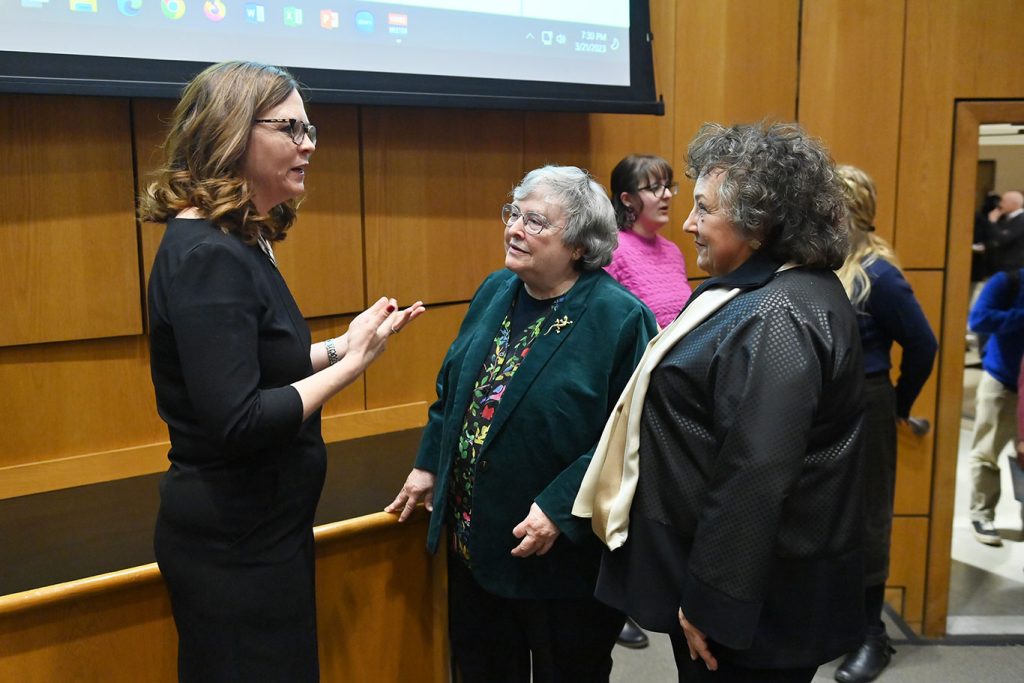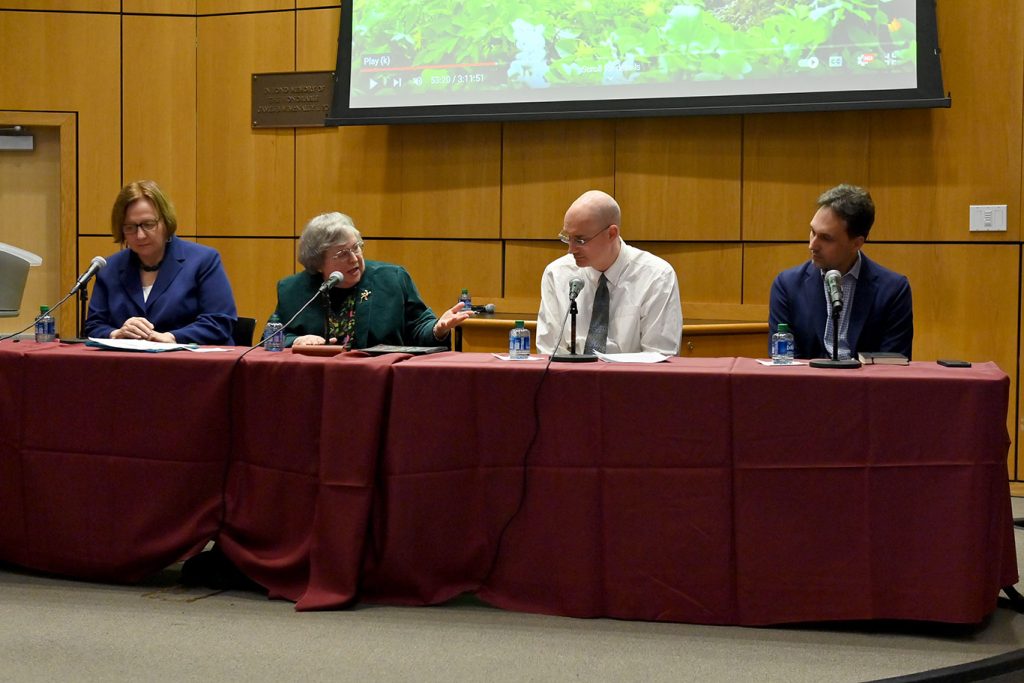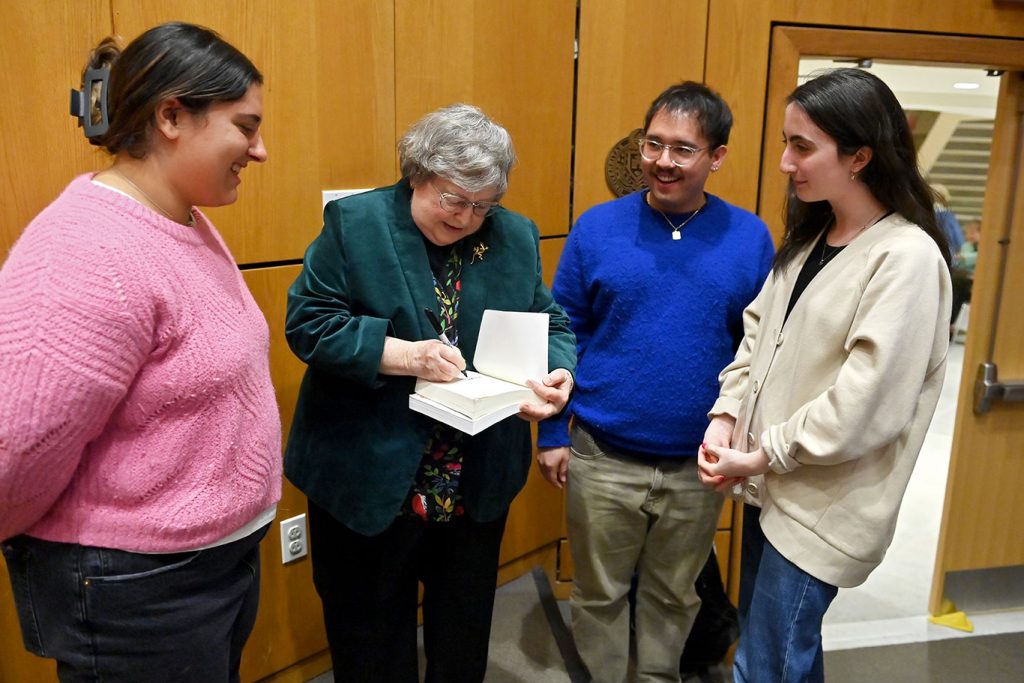“We need to change from thinking that we are masters of the universe to realizing that we are siblings, or kin, with all other beings in the community of creation, loved by God,” she said.
Sister Johnson’s talk, “Theology & the Earth: Human Beings in the Community of Creation” helped launch a new initiative, the Elizabeth A. Johnson, C.S.J., Endowed Fund for Theology & the Earth. The fund, which has received initial donations from Margaret Sharkey, PCS ’15, will go to advance the study of theology and our responsibility to the Earth.
Sister Johnson was joined by respondents Jason Morris, Ph.D., professor of biology, and Michael Pirson, Ph.D., the James A. F. Stoner Endowed Chair in Global Sustainability at the Gabelli School of Business.
Creation is Ongoing
The need for change has become apparent: A report issued on Monday by the Intergovernmental Panel on Climate Change found that the planet is likely to cross a critical threshold for global warming within the next decade.
To spur action, Sister Johnson said humans need to feel a greater connection with living things. That means casting aside old ways of thinking about the world, such as the idea that the creation of the world ceased entirely once it was done.
“One striking metaphor from a British philosopher puts it this way: the Creator ‘makes all things and keeps them in existence from moment to moment, not like a sculptor who makes a statue and leaves it alone, but like a singer who keeps her song in existence at all times,’” she said.
Once we realize we’re part of that same journey, she said, it’s easier to see the intrinsic value in all living things. Pope Francis addressed this in his encyclical Laudato Si, when he wrote, “Creation is a gift in which every creature has its own value and significance.”
“As creatures, we have more in common with other species than what separates us. We are kin to the bear, the raven, and the bugs,” Sister Johnson said.

Obstacles to Overcome
Sister Johnson said we need to stop thinking that humans stand apart from the natural world. She blamed this thinking on the “hierarchy of being,” a concept that ranks beings according to their “spirit.” In it, rocks are at the bottom, followed by plants, animals, humans, and angels.
“Instead of a circle of kinship, this structures the world as a pyramid,” she said, noting that in the European world, this also led white men to rank women and minorities below them.
Who Needs Who?
One way to shake off the idea that humans are superior to all else is to engage in a thought experiment.
“Take away trees, and humans would suffocate. Take away humans, and trees would do just fine,” she said. “So who needs who more?”
Ultimately, human hubris about our place in the world needs to be addressed through what Sister Johnson called a “robust creation theology.” She conceded that to some religious ears, it might seem strange to be “converted to the Earth,” but noted that in Laudato Si, Pope Francis provided guidance with his words:
“Eternal life will be a shared experience of wonder, in which each creature resplendently transfigured will take its rightful place.”
“You know that famous question’ Will I see my dog in heaven?’ The answer is right here,” Sister Johnson said.

Anna Nowalk, a senior at Fordham College at Lincoln Center majoring in theology, was eager to see Johnson speak after reading her book She Who Is (Crossroads Publishing, 2002).
“The idea that God is lovingly willing us into existence constantly is one of my favorite theological concepts,” she said.
“I’m also really glad that they had someone from the Gabelli School there. If you’re talking about the need to have a sense of conversion to the environment, I think it’s very important to include business in there.”
Christian Ramirez, a senior at Fordham College at Rose Hill also majoring in theology, said She Who Is radically changed the way he thinks about faith and brought his copy for her to sign.
“I love this idea of the circle of the kinship of creation, rather than a pyramidal hierarchy of being. I was really interested in how she was going to incorporate feminist theology into ecological theology,” he said.
“When we create a circle of kinship where the man is displaced from the top and becomes part of the circle, that elevates all creatures.”


